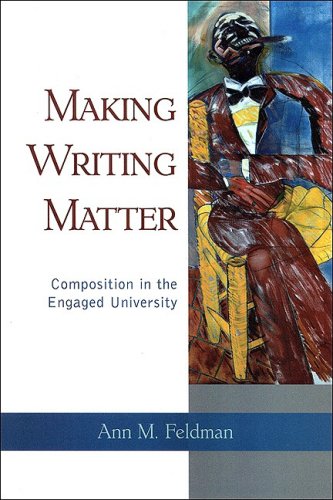

Most ebook files are in PDF format, so you can easily read them using various software such as Foxit Reader or directly on the Google Chrome browser.
Some ebook files are released by publishers in other formats such as .awz, .mobi, .epub, .fb2, etc. You may need to install specific software to read these formats on mobile/PC, such as Calibre.
Please read the tutorial at this link: https://ebookbell.com/faq
We offer FREE conversion to the popular formats you request; however, this may take some time. Therefore, right after payment, please email us, and we will try to provide the service as quickly as possible.
For some exceptional file formats or broken links (if any), please refrain from opening any disputes. Instead, email us first, and we will try to assist within a maximum of 6 hours.
EbookBell Team

0.0
0 reviews
ISBN 10: 0791473813
ISBN 13: 9780791473818
Author: Ann M Feldman
Challenging more limited approaches to service learning, this book examines writing instruction in the context of universities fully engaged in community partnerships. In Making Writing Matter, Ann M. Feldman explores how changing scholarship at engaged metropolitan universities offers an opportunity to redesign first-year writing classes in ways that make students better writers. An engaged university commits to a relationship with its surrounding metropolitan area, with faculty members undertaking collaborative research with community partners. The more vibrant, participatory role of an engaged university allows students to link their academic studies to important public issues and gain real-world writing experience, such as writing press releases and letters to organizations. This newly focused and contextualized research and scholarship at engaged universities shows students how discourse and writing matter in new ways.
Part One. The Place of Writing in the University
1. Engaged Scholarship at the University
Changing the Kind of Thing We Do Around Here
Important Work, But Not University Partnership
How Discourse Drives Engagement
The New Learner Writes
Educating Citizens to Write
When Students “Walk” the City
2. Writing as Participation
The Purloined Petition
Institution, Genre, and Social Action
This Container Isn’t Big Enough
Writing About What Others Have Written
Writing for Participation
Revision or Social Action?
Writing in a Community of Practice
3. Telling Tales Out of School
When Is a Diary Not a Diary?
Down the Elevator
Both Ends Against the Middle
The University in Ruins
What’s a Writing Program For?
The Mountain Makes Its Own Weather
Learning to Spell Rescission
The Grammar Sessions
Getting What You Wish For
Reflecting on Experience?
Part Two. Designing Instruction to Make Writing Matter
4. Rethinking Reflection in Community-Based Writing
A New Space for Teaching and Learning
Tales of Becoming a Writer
Performing in Writing
The Memoir and Its Truth or Consequences
On Not Assigning Literacy Narratives
Against Reflection
Recruiting Students for CCLCP
Developing Community-Based Partnerships
Designing a First-Year Curriculum for CCLCP
Recapping the Argument
5. Assessing Writing and Learning in Community-Based Courses
Entering a New Situation
Situated Writing and Learning
Complicating Assessment
Developing an Assessment Matrix
Conducting Assessment
6. Teaching the Teachers
Writing About Essays
The Syllabus as Genre
Against First-Year Writing
The Paradox of Transferability
Designing Situated Writing Projects
A Manifesto for First-Year Writing
properties of matter writing prompt
why does writing matter
how to make a writing better
how to improve composition writing
how to make a lead in news writing
r matters
writing matters teacher manual
Tags: Ann M Feldman, Matter, Composition